Amazon founder Jeff Bezos will relinquish his role as the retail behemoth’s chief executive this summer, passing the baton to Andy Jassy, the current chief of Amazon’s hugely profitable cloud computing division. Bezos, who in recent years had already “stepped back from much of the day-to-day business,” will take on the role of executive chairman […]

BEIRUT (AP) — Joana Dagher lay unconscious and hemorrhaging under a pile of rubble in her apartment after the massive Beirut port blast in August, on the brink of death. She survived because of the courage of her husband who got her out, the kindness of a stranger who transported her in his damaged car and the help of her sisters during the chaos at the overwhelmed hospital. But Dagher doesn’t remember any of that: The 33-year-old mother of two lost her memory for two full months from the trauma she suffered in the explosion, including a cerebral contusion and brain lesions. “I lost my life on August 4,” Dagher said. “I lost my house, I lost my memory, I lost two friends,” she added, referring to neighbors killed in the explosion. “I lost my mental health, and so I lost everything.”
The Beirut explosion, which killed more than 200 people and injured more than 6,000, caused wounds on an even wider scale on the mental health of those who lived through it. Dagher is gradually regaining her memory. But another kind of pain lingers. Though therapy now helps, she said she no longer feels the same. Dagher is usually a calm and independent person, her sister Jihane said. Now she experiences bursts of anger and stress, emotionally shutting down and at times getting aggressive — all signs of post-traumatic stress disorder, according to experts. “The past 6 months have been a purgatory,” Jihane said. “When you see someone you love suffer so much, everyone suffers with them, you are helpless.” The blast was caused by a fire that ignited nearly 3,000 tons of ammonium nitrate stored in a port warehouse. One of the biggest non-nuclear explosions ever recorded, the force tore through the city, sending people flying across rooms and slicing them with flying glass. Windows and doors were blown out miles away from the epicenter.
BEIRUT, Feb. 1 (Xinhua) — The Lebanese army received on Monday at Port of Beirut 100 armored transport vehicles donated from the British authorities, the National News Agency reported. Brigadier General Ziad Nasr, who represents Armed Forces Commander General Joseph Aoun, thanked the British authorities for their continued support for the Lebanese army, noting that […]
by reuters — BEIRUT: Lebanon’s Hezbollah said on Monday it brought down an Israeli drone that had entered Lebanese airspace, while the Israeli military said one of its drones had fallen inside Lebanon. Hezbollah said in a statement carried by Al-Manar television that it was now in control of the drone. The Israeli military said […]
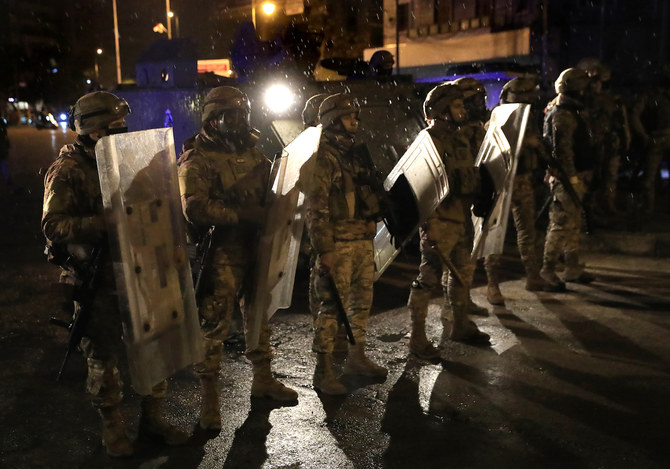
By DR. DANIA KOLEILAT KHATIB — arabnews.com — Lebanon’s capital of the north is burning. Tripoli has witnessed violent riots in the last few days. The city that was previously a cultural and trade hub has been suffering from poverty and neglect by the central government for decades. The irony is that Tripoli is the home of some of Lebanon’s richest politicians. However, these politicians, who have done well for themselves and become billionaires, have done nothing to lift the city out of poverty. Tripoli is one of the poorest cities in the Middle East, with 80 percent of the population living on less than $2 a day. The city that was already struggling with poverty was also hit hard by the coronavirus disease and those who were hardly able to make ends meet were devastated by lockdown. Those who live from day to day — taxi drivers, porters, street sellers and the like — found themselves without any income. Similar to all the government’s promises, the offer of support was never fulfilled.
Youngsters went all over the city; they were angry and hungry. Last week’s protests led to riots, resulting in 226 being wounded and one killed. However, the riots were expected. More than a year ago, a member of the Tripoli municipality complained to me about the deteriorating situation in the city and the north in general. He told me that people in poor areas surrounding the city, particularly Bab Al-Tabbaneh, threatened him and his colleagues that they would raid the city and take whatever they could if the government did not provide them with minimal relief. The riots did not happen as spontaneously as expected. They were, of course, fueled by the starving population. Nevertheless, outside forces contributed by steering the violence for political purposes. A contact in Tripoli told me of rioters who carried with them hundreds of sticks of fireworks and Molotov cocktails. How can someone who can’t afford to buy a loaf of bread afford such weapons? Another contact told me that he and his peers went to the protests but, when they noticed the violence organized by some elements, they immediately left.

Beirut – By Vivian Haddad — aawsat.com — In the midst of lockdown that has been imposed on the Lebanese since January 14, 2021, museums, galleries, and even managers of film festivals are refusing to have their hands tied. Through weekly and monthly initiatives, they are trying to ease people’s stress and boredom. People are enjoying virtual tours of museums and exhibits, as well as film screenings. In this context, the 6th edition of the Beirut Art Film Festival (BAFF) will screen movies on a Sunday evening every month, starting off this upcoming Sunday, January 31, with a documentary film about Winston Churchill, titled “Churchill & the Movie Mogul.” Winston Churchill was mad about films, more than any other politician in history. The true extent of his use of films as a propaganda tool has not been previously explored, the group says about the film.
Speaking to Asharq Al-Awsat, Alice Mogabgab, the director of the Beirut Art Film Festival, says: “We wanted to screen this movie to indicate the importance of cinema’s role in the world of politics. Churchill used it to achieve his political objectives and influence his colleagues inside and outside Britain.” “The movie will show how Churchill compelled the US to engage in the Second World War.” She adds that “the film also sheds light on the director Alexander Korda’s character. He produced many movies that had a great impact on modern cinema, like Gone with the Wind.” Mogabgab says that everyone needs to take a break from the situation of the pandemic that we are living today. “That is why we thought of holding the 6th edition of the festival virtually to screen famous works. After Churchill’s movie, we will share a list of new movies that will be screened once a month until next December, the date of the festival’s seventh edition.” After the movie ends, a roundtable discussion about it will be held.
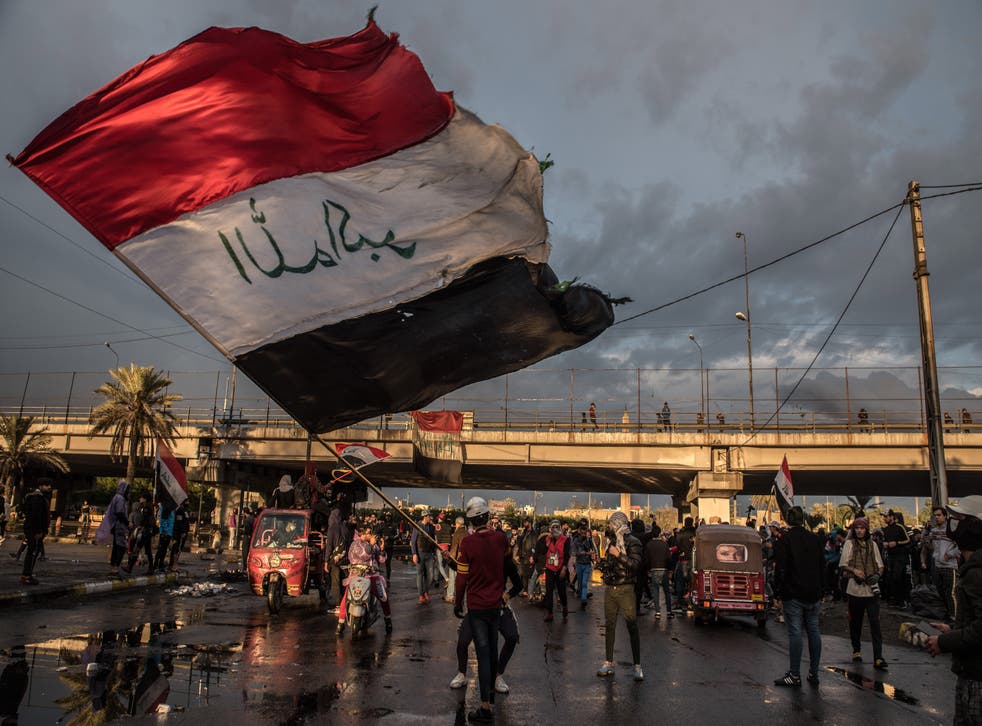
By Liz Sly — independent.co.uk — Much of the Arab world erupted in jubilant revolt 10 years ago against the dictatorial regimes whose corruption, cruelty and mismanagement had mired the Middle East in poverty and backwardness for decades. Now, the hopes awakened by the protests have vanished but the underlying conditions that drove the unrest are as acute as ever. Autocrats rule with an even tighter grip. Wars unleashed by leaders whose control was threatened have killed hundreds of thousands of people. The rise of the Islamic State amid the resulting wreckage ravaged large parts of Syria and Iraq and drew the United States into another costly Middle East war. Millions of people were driven from their homes to become refugees, many converging on the shores of Europe and beyond. The influx fuelled a tide of nativism and anti-immigrant sentiment that brought populist leaders to power in Europe and the US as fears of terrorism eclipsed concerns for human rights as a Western priority. Even in those countries that did not descend into war, more Arabs are now living in poverty, more are unemployed and more are imprisoned for their political beliefs than a decade ago.
Only in Tunisia, where the protests began, did anything resembling a democracy emerge from the upheaval. The fall of Zine el-Abidine Ben Ali, the Tunisian President, after a month of street protests in Tunis inspired demonstrations across the Middle East, including the mass protest on 25 January 2011 in Cairo’s Tahrir Square that fixated world attention on what was prematurely labelled the Arab Spring. On its face, the Arab Spring failed, and spectacularly so – not only by failing to deliver political freedom but by further entrenching the rule of corrupt leaders more intent on their own survival than delivering help. “It’s been a lost decade,” said Tarik Yousef, director of the Brookings Doha Centre in Qatar, recalling the euphoria he initially felt when the fall of Libya’s Moammar Gaddafi in August 2011 enabled him to return home for the first time in years. “Now we have the return of fear and intimidation. The region has experienced setbacks at every turn.”
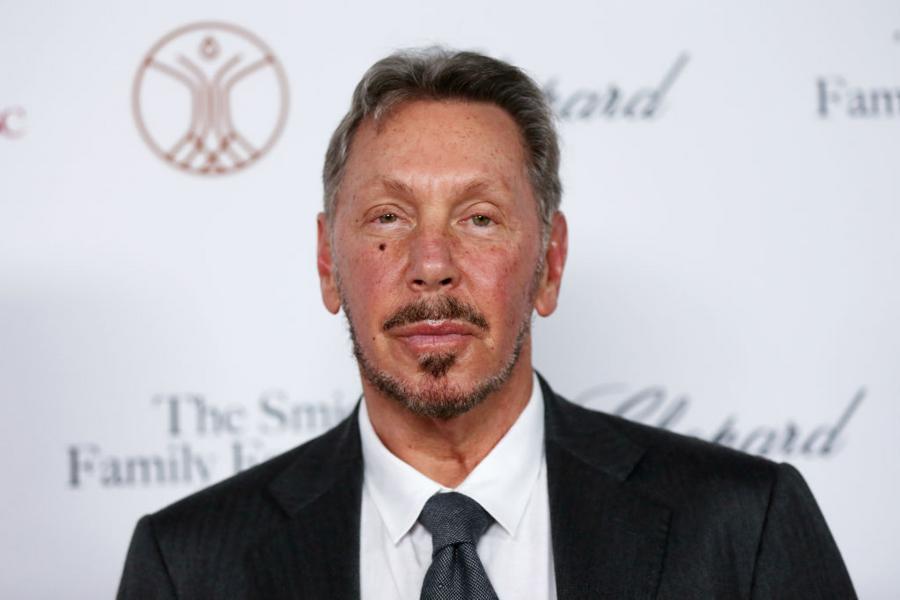
by celebritynetworth.com — Larry Ellison is primarily known as the founder and former CEO of database giant Oracle. For those of you who are not aware, for much of the pre-internet 80s and 90s, Oracle was the dominate supplier of software for business systems. You know how Microsoft dominated personal computing with software like Excel and Word? Oracle had the same dominance with software that powered payroll systems, hospital records, hotel/airline booking services… etc. Today, Oracle is one of a few dominant “cloud” database companies. If you receive a paycheck from or fill out expense reports for a medium to large company, there’s a good chance Oracle is powering that software behind the scenes. Ellison took Oracle public on March 12, 1986, literally ONE DAY before his rival Bill Gates took Microsoft public.
Over the last 20 years Larry has cashed out at least $10 billion from Oracle through stock sales and dividends. He has used some of the proceeds generated by these sales to acquire arguably the coolest portfolio of toys, real estate, hobbies and endeavors in the world. He owns the entire Hawaiian Island of Lanai. He literally owns 99% of the island’s land and ALL of its buildings, including its two ultra-exclusive Four Seasons resort locations. He also basically owns an America’s Cup racing team, TWELVE homes in Malibu, the 249-acre Porcupine Creek Estate golf course in Ranch Mirage, California, the Indian Wells Tennis Garden in Coachella, California, several private jets, a Mig-29 fighter jet, an airline… I could go on and on, but I’ll stop there.
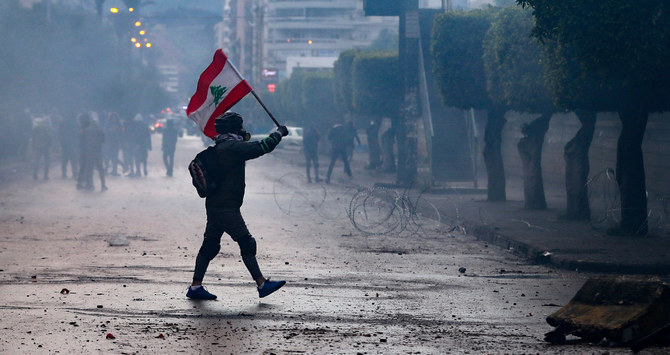
By NAJIA HOUSSARI — arabnews.com — BEIRUT: Lebanon on Thursday launched an electronic platform for citizens and residents wishing to receive the coronavirus vaccine. Meanwhile, protests over the full lockdown have spread to cities in the south of Lebanon, considered as pro-Hezbollah and Amal Movement. Demonstrations in Tripoli turned violent — a protester was killed and tens of people were injured during clashes with security forces that have continued for the fifth consecutive day. In a conference on Thursday, Lebanon’s Caretaker Health Minister Hamad Hassan hoped citizens would “respond to the national plan to inoculate over 80 percent of the population and achieve herd immunity to protect society from the virus.” Registration began as soon as the platform’s launch was announced, with an average of 2,000 people visiting the site every five minutes. The Health Ministry said that “the official vaccination platform protects the privacy of beneficiaries as well as the database and was tested under the supervision of an IT team from the World Bank to ensure it cannot be hacked.” Hassan, who has recently recovered from COVID-19, said: “The vaccination plan requires the commitment of all institutions and administration to the principle of equality and justice above any other consideration, whether political, regional or sectarian.”
Caretaker Information Minister Manal Abdel Samad said in a press conference: “The number of coronavirus cases in the productive sectors is extremely high, with 72 percent of the cases from the productive segments of society, i.e., those between 20 and 59 years old, which reflects the danger of this pandemic.” Abdel Rahman Bizri, head of the national committee for the administration of the COVID-19 vaccine, told Arab News: “Lebanon needs to vaccinate between 70 and 80 percent of its population to achieve herd immunity.” “The Pfizer vaccine that Lebanon has chosen for its vaccination plan is expected to arrive to the country between Feb. 7 and 15, to be followed by more doses in in March,” he said. The first phase of the vaccination plan is expected to cover medical staff and workers in the health care sector, as well as citizens and residents who are 75 and older, to be followed by younger groups in the next phases.
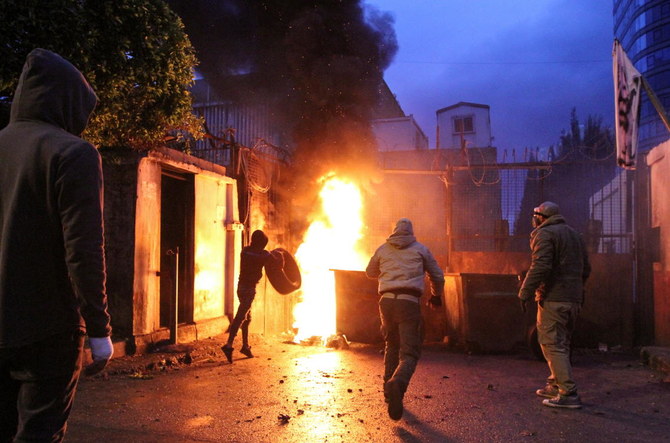
by reuters — TRIPOLI, Lebanon: Lebanon’s caretaker prime minister and its president on Friday condemned overnight violence in the city of Tripoli, where protesters angry over a strict lockdown clashed with security forces and set the municipality building on fire. Thursday was the fourth straight night of unrest in one of Lebanon’s poorest cities, after the Beirut government imposed a 24-hour curfew to curb a surge in the COVID-19 pandemic that has killed more than 2,500 people and compounded an economic crisis. “The criminals who set the municipality on fire and attempted to burn the court…represent a black hatred for Tripoli,” Prime Minister Hassan Diab said in a statement. “The challenge now is in defeating these criminals by arresting them one by one and referring them to the judicial system.” President Michel Aoun also condemned the violence. Flames engulfed the Tripoli municipal government building after it caught fire just before midnight on Thursday. Police had been firing tear gas at protesters hurling petrol bombs. A funeral for a man who died from a gunshot wound on Wednesday night had given fuel to protesters. Security forces said they had fired live rounds to disperse rioters trying to storm the government building.
Diab’s statement did not mention the killing; Human Rights Watch has called for it to be investigated. “We promise to work quickly to restore the municipality building of Tripoli so that it remains an expression of its dignity and pure heritage,” Diab said. The lockdown against the coronavirus, in effect since Jan. 11, is piling extra hardship on the poor, now more than half the Lebanese population who get little government aid. “We are demanding a state, we are demanding a country and we are demanding an improvement to the social and political conditions in Tripoli,” said Rabih Mina, a Tripoli resident who joined the anti-government protests. The financial meltdown gripping Lebanon could render people more dependent on political factions for aid and security, in a throwback to the 1975-90 civil war era of dominant militias. Some analysts have warned that security forces, their wages fast losing value, would not be able to contain rising unrest.



